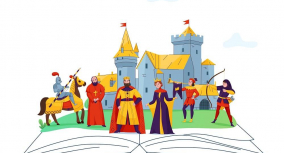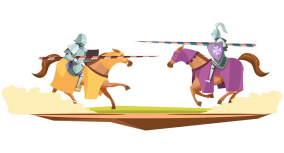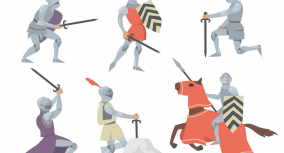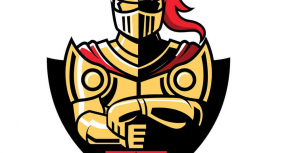Sir Gawain and the Green Knight is a story about a noble Gawain, a member of King Arthur’s round table. It was written by an anonymous Middle ages author. Throughout the poem, the main character meets with a number of other heroes.
Some of Sir Gawain and the Green Knight’s characters include King Arthur, the Green Knight, Queen Guinevere, Lady Bertilak, Lord Bertilak, and Morgan le Faye. There are other minor Camelot characters, as well as Lord Bertilak’s court characters in the poem.
List of Characters in Sir Gawain and the Green Knight
Before going into detail, let’s take a quick look at the main characters:
Sir Gawain and the Green Knight Characters Infographic
Check out this character map to learn more about Sir Gawain and others:
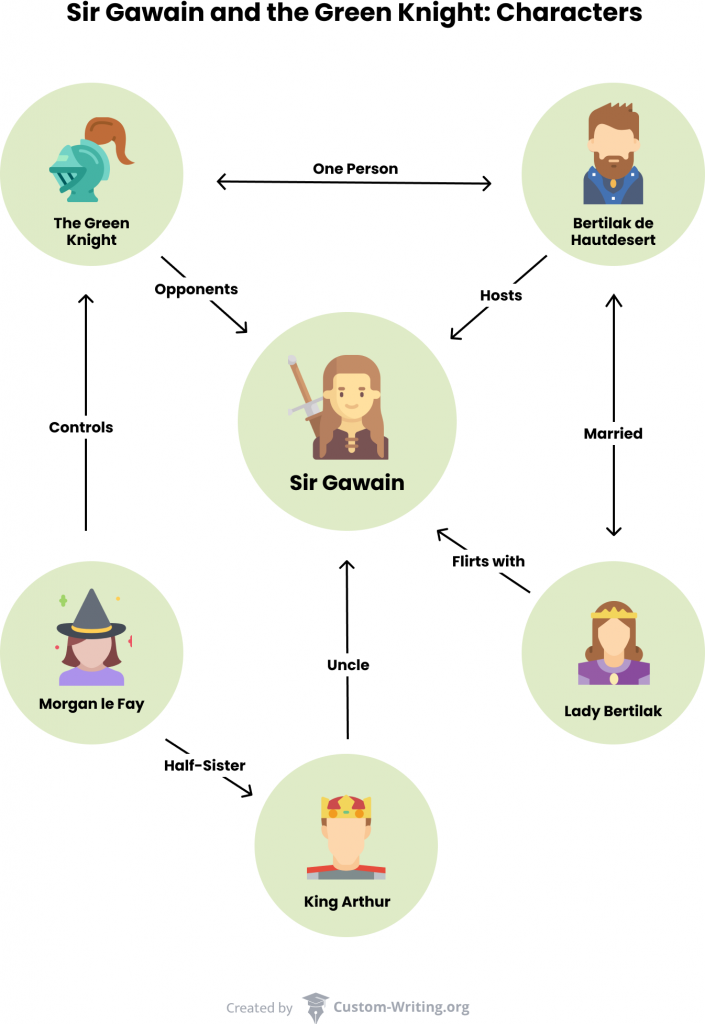
Sir Gawain Characteristics
Sir Gawain is the protagonist of the story. In relation to Arthur, Gawain is his nephew and one of his most loyal knights. In this particular poem, he is portrayed as an honest, humble, and brave person. In the beginning, Gawain sacrifices himself to spare King Arthur from the Green Knight’s deadly challenge.
As the story progresses, Gawain faces several other tests—physical, mental, and spiritual. They reveal his character traits to the readers and himself. Besides, they show controversy of the protagonist’s main qualities:
- Honesty. Despite being known as a true loyal knight, Sir Gawain hides the green girdle presented by Lady Bertilak. Thus, he deceives his host and tries to gain a secret advantage over the Green Knight.
- Bravery. Sir Gawain is a courageous knight, yet he naturally fears death. He instinctively flinches from the axe for all his hopes for the “magic” girdle and beliefs that induced him to seek the Green Knight to fulfill the compact.
- Chastity. Sir Gawain is the knight of the Virgin Mary whose image is painted on his shield. At the same time, he is strongly attracted to Lady Bertilak. And still, despite this attraction, he can withstand her charm.
- Courtesy. Being known as a gallant knight, Sir Gawain, enraged, uses misogynistic statements. He declares that women are deceitful and “a gain ‘twould be vast to love them well and believe them not.”
These controversies and weaknesses add depth to the character and show Sir Gawain as a human being with human emotions. They don’t make the protagonist less appealing character. Instead, they highlight his capability of transformation and taking responsibility for his behavior.
Moreover, his character and story are unusual for the romance genre and Arthurian legends. Mainly because after accepting the challenge, Gawain experiences doubt and fear. Such feelings a member of chivalry isn’t supposed to feel. This spiritual journey turns Gawain into a hero who is realistic about his limitations. He returns to Camelot, riding his horse, Gringolet, not as victorious as he left.
Sir Gawain’s Quotes:
Quoth Gawain to the King, “I pray right worthily
Sir Gawain, Sir Gawain, Part I, Lines 342-349
Thou bid me quit this seat, and take my stand by thee,
That so without reproach, I from this board may rise,
And that it be not ill in my liege lady’s eyes,
I’ll to thy counsel come before this royal court,
Unfitting do I deem that such a boon be sought,
And such a challenge raised in this your goodly hall
That thou thyself be fain to answer it withal”
Since talk, it mendeth naught, ’t were trifling ease to seek;
Sir Gawain, Sir Gawain, Part II, Lines 546-548
I to the blow am bound, to-morrow must I fare
To seek the Knight in Green, God knoweth how, or where.
Until the Yuletide Eve alone that gallant knight did fare;
Sir Gawain, Narrator, Part II, Lines 733-738
Sir Gawain, at that tide,
To Mary made his prayer,
For fain he was to ride
Where he might shelter share.
The Green Knight
The Green Knight is known in the poem as “The Knight of Green Chapel.” He is not a human being: his color, size, and ability to live without his head indicate that. He is rude, masculine, and valiant, which makes him look different from Arthur’s court. When he comes without an invitation to Camelot, he says that no one among Arthur’s knights could fight against him. Therefore, he offered a game to them, which Gawain has to accept to save his King.
As agreed, Gawain meets the Green Knight once again in front of The Green Chapel a year later. Throughout the story, he is depicted as a villain. However, the reader learns who the Green Knight is only at the end of the poem. He reveals that he isn’t planning to kill Gawain. Instead, he praises the protagonist for his bravery. He also mocks him for withholding the girdle that belongs to Lord Bertilak. In the end, the Green Knight and Gawain part as friends.
In this poem, the Green Knight tests Gawain’s courage and honesty, ultimately proving that an instinct to live is more potent than anything else. And yes, he is Lord Bertilak.
The Green Knight’s Quotes
“By Christ,” quoth the Green Knight, “I trow I am full fain
Sir Gawain, Green Knight, Part I, Lines 389-396
The blow that here I craved to take from thee, Gawain,
And thou hast well rehearsed, in fashion fair, I trow,
The covenant and the boon I prayed the king but now;
Save that thou here, Sir Knight, shalt soothly swear to me
To seek me out thyself, where e’er it seemeth thee
I may be found on field, and there in turn demand
Such dole as thou shalt deal before this goodly band!”
The Green Knight on the ground made ready speedily,
Sir Gawain, Narrator, Part I, Lines 416-422
He bent his head adown, that so his neck were free,
His long and lovely locks, across the crown they fell,
His bare neck to the nape all men might see right well
Gawain, he gripped his axe, and swung it up on high,
The left foot on the ground he setteth steadily
Upon the neck so bare he let the blade alight.
The Green Knight laughed aloud, and spake right merrily,
Sir Gawain, Green Knight, Part IV, Lines 2388-2394
“Whole am I of the hurt that thou didst deal to me;
Thy misdeeds hast thou shewn, and hast confessed thee clean,
Hast borne the penance sharp of this, mine axe-edge keen,
I hold thee here absolved, and purged as clean this morn
As thou hadst ne’er done wrong since the day thou wert born.
This girdle, hemmed with gold, Sir Knight, I give to thee.”
King Arthur
In Sir Gawain and the Green Knight, Arthur, the legendary British king, is depicted as a youthful and cheerful hero. Some critics argue that the poet tries to portray him as being immature through this description.
When the Green Knight challenges the court, Arthur is ready to accept the challenge. It means that among all the knights, he is still one of the most courageous.
King Arthur’s Quotes
But of all kings who e’er o’er Britain lords have been,
Sir Gawain, Narrator, Part I, Lines 25-29
Fairest was Arthur all, and boldest, so men tell;
Therefore I think to shew a venture that befell
In his time, which some men for a sheer wonder hold,
And strange above all tales that be of Arthur told.
Arthur, he would not eat till all were served with food,
Sir Gawain, Narrator, Part I, Lines 85-86
Glad of his gladness he, somewhat of a child-like mood.
And quoth, “By Heaven, Sir Knight, thou speakest foolishly,
Sir Gawain, King Arthur, Part I, Lines 322-330
But what thy folly craves we needs must grant to thee,
I trow no knight of mine thy boastful words doth fear,
That goodly axe of thine in God’s name give me here,
And I will give the boon which thou dost here demand!”
With that he lightly leapt, and caught him by the hand,
Then lighted down the knight, before the King he stood,
And Arthur, by the haft he gripped that axe so good,
And swung it sternly round, as one who thought to smite.
Queen Guinevere
Queen Guinevere, Arthur’s wife, serves as a symbol of ideal beauty. She does not influence the plot, appearing briefly in the beginning and end. Critics assign her appearance to be more of a marker of the romance genre.
However, at the end of the poem, the readers learn that the Green Knight’s challenge was motivated by Morgan le Fay’s hatred towards the Queen.
Queen Guinevere’s Quotes
Upon the royal dais, high in the midmost hall.
Sir Gawain, Narrator, Part I, Lines 75-84
Sendal swept at her side, and eke above her head
A tapestry of Tars, and choice Toulouse outspread,
And all embroidered fair, and set with gems so gay
That might be proved of price, an ye their worth would pay
one day;
Right fair she was, the queen,
With eyes of shining grey, That fairer he had seen
No man might soothly say!
Fairest was she in skin, in figure, and in face,
Sir Gawain, Narrator, Part II, Lines 942-934
Of height and colour too, in every way so fair
That e’en Gaynore, the queen, might scarce with her compare.
That good Gawain had come—Methinks they deemed it gain,
Sir Gawain, Narrator, Part IV, Lines 2490-2494
To greet that knight with kiss the king and queen were fain,
And many a valiant knight would kiss and clasp him there—
Eager, they tidings ask, How did his venture fare
And he doth truly tell of all his toil and care.
Lord Bertilak de Hautdesert
Lord Betrilak of Hautdesert is the lord of the massive castle and Gawain’s host. His palace and his court are contrasted to the one in Camelot. He lives by the rules of honesty rather than by any human-made knight code. He is also much closer to nature than King Arthur’s court, which represents civilization. At the castle, Bertilak tries to test Gawain’s loyalty and purity by instructing Lady Bertilak to seduce the protagonist.
In the end, the reader learns that the Green Knight is Betrilak’s alter ego. However, it is not a surprise for anyone besides Gawain. Bertilak and the Green Knight’s physical appearance is strikingly similar: tall, strong, handsome, big beard. Another similarity is that both of the characters offer the protagonist to play an exchange game.
Lord Bertilak’s Quotes
Gawain gazed on the knight, who goodly greeting gave,
Sir Gawain, Narrator, Part II, Lines 841-846
And deemed that burg so bright was owned of baron brave,
For huge was he in height, and manhood’s age he knew,
His broad beard on his breast, as beaver was its hue.
And stalwart in his stride, and strong, and straight, was he,
His face was red as fire, and frank his speech and free.
The lord, with merry jest, and laugh of gladsome glee
Sir Gawain, Narrator, Part III, Lines 1622-1627
Soon as he saw Gawain, spake words both fair and free,
(The ladies too he bade, e’en with the household all—)
The boar’s shields doth he show, and tells his tale withal,
How broad he was, how long, how savage in his mood,
That grisly swine—and how they chased him thro’ the wood.
The lord withheld his leave, praying him strait to stay:
Sir Gawain, Lord Bertilak, Part III, Lines 1671-1674
“As I be faithful knight, I pledge my troth alway
Thou shalt thy tryst fulfil, there at the Chapel Green,
Before the New Year’s Morn hath waxed to prime.”
Lady Bertilak
In the poem, Lady Bertilak is Lord Bertilak’s wife. She is stunningly beautiful. The author even describes her as being more attractive than Queen Guinevere, who symbolizes ideal beauty. However, Lady Bertilak possesses enormous sexual power. She is not a woman to put on a pedestal.
Indeed, the Lady is a very unusual character for medieval romance: she knows how to play with men and seduce them. She is also an extraordinary conversationalist, and unlike Queen Guinevere, she has a voice.
The Green Knight reveals Lady Bertilak’s role later. The reader learns that she was instructed by Lord Bertilak and Morgan le Faye all this time. Oversudden, Lady Bertilak turns into a powerless woman manipulated by her husband and the old witch.
Lady Bertilak’s Quotes
It was the lady fair, most lovely to behold!
Sir Gawain, Narrator, Part III, Line 1186
Then ’t was the lady’s will to see that knight with eye,
Sir Gawain, Narrator, Part III, Lines 940-943
With many a maiden fair she cometh from her place,
Fairest was she in skin, in figure, and in face,
Of height and colour too, in every way so fair.
Her chin and cheeks are sweet
Sir Gawain, Narrator, Part III, Lines 1203-1206
In red and white devise,
Gracious, she doth him greet
With laughing lips and eyes.
Morgan le Faye
There are three women in Sir Gawain and the Green Knight. Two of them are portrayed as young and beautiful. The third one, Morgan le Faye, is old and unattractive. In medieval literature, beautiful ladies have tremendous power over knights. However, in this story, an old crag has more power than any other woman in the poem.
The reader sees Morgan le Faye as an older woman who lives at Lord Bertilak’s castle. Her name is not mentioned until the end of the poem. It turns out that Morgan le Faye is a witch and the driving force of the entire plot. She is also Arthur’s old sister.
The plan that Morgan le Faye has is explained at the very end. First, she wants to frighten the Queen to death. Second, she tries to shame King Arthur’s court. She accomplishes her plan. In most of the medieval legends, she is the enemy of Arthur and the lover of Merlin. However, the woman is the real antagonist of the poem.
Morgan le Faye’s Quotes
Led by another dame, who at her left hand stood;
Sir Gawain, Narrator, Part II, Lines 946-950
Older she was, I trow, and reverend seemingly,
With goodly following of nobles, verily;
But all unlike to sight, I trow, those ladies were,
Yellow, the older dame, whereas the first was fair.
“That truly will I tell,” so spake that baron brave:
Sir Gawain, Lord Bertilak, Part IV, Lines 2443-2454
“Bernlak de Hautdesert, so men me rightly call—
’T is she, Morgain la Faye, who dwelleth in mine hall,
(Who knoweth many a craft, well versed in cunning wile,
Mistress of Merlin erst,) doth many a man beguile,
(And many a druerie dear she dealt with that same wight,
Who was a skilful clerk, and well he knew each knight
of fame—)
Morgain, the goddess, she,
So men that lady name,
And none so proud shall be
But she his pride can tame!
She sent me in this guise unto King Arthur’s hall
Sir Gawain, Lord Bertilak, Part IV, Lines 2455-2459
To test your knightly pride, if it were sooth, withal,
The fair renown that runs, of this, your Table Round,
’T was she taught me the craft which ye so strange have found,
To grieve Gaynore, the queen, and her to death to fright.
